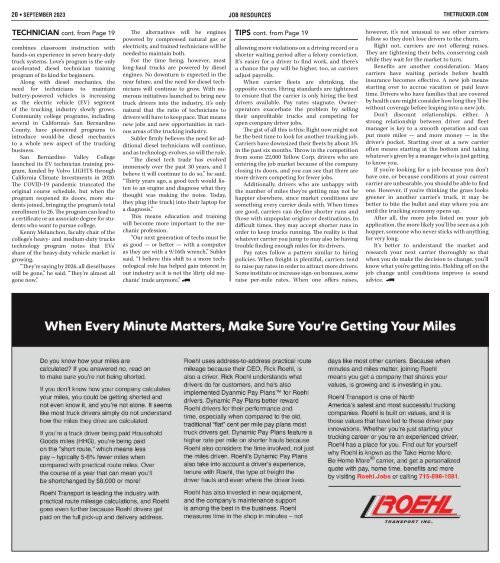You also want an ePaper? Increase the reach of your titles
YUMPU automatically turns print PDFs into web optimized ePapers that Google loves.
20 • SEPTEMBER 2023 JOB RESOURCES<br />
TECHNICIAN cont. from Page 19 TIPS cont. from Page 19<br />
combines classroom instruction with<br />
hands-on experience in seven heavy-duty<br />
truck systems. Love’s program is the only<br />
accelerated diesel technician training<br />
program of its kind for beginners.<br />
Along with diesel mechanics, the<br />
need for technicians to maintain<br />
battery-powered vehicles is increasing<br />
as the electric vehicle (EV) segment<br />
of the trucking industry slowly grows.<br />
Community college programs, including<br />
several in California’s San Bernardino<br />
County, have pioneered programs to<br />
introduce would-be diesel mechanics<br />
to a whole new aspect of the trucking<br />
business.<br />
San Bernardino Valley College<br />
launched its EV technician training program,<br />
funded by Volvo LIGHTS through<br />
California Climate Investments in 2020.<br />
The COVID-19 pandemic truncated the<br />
original course schedule, but when the<br />
program reopened its doors, more students<br />
joined, bringing the program’s total<br />
enrollment to 26. The program can lead to<br />
a certificate or an associate degree for students<br />
who want to pursue college.<br />
Kenny Melanchon, faculty chair of the<br />
college’s heavy- and medium-duty trucks<br />
technology program notes that EVs’<br />
share of the heavy-duty vehicle market is<br />
growing.<br />
“They’re saying by 2026, all diesel buses<br />
will be gone,” he said. “They’re almost all<br />
gone now.”<br />
The alternatives will be engines<br />
powered by compressed natural gas or<br />
electricity, and trained technicians will be<br />
needed to maintain both.<br />
For the time being, however, most<br />
long-haul trucks are powered by diesel<br />
engines. No downturn is expected in the<br />
near future, and the need for diesel technicians<br />
will continue to grow. With numerous<br />
initiatives launched to bring new<br />
truck drivers into the industry, it’s only<br />
natural that the ratio of technicians to<br />
drivers will have to keep pace. That means<br />
new jobs and new opportunities in various<br />
areas of the trucking industry.<br />
Subler firmly believes the need for additional<br />
diesel technicians will continue,<br />
and as technology evolves, so will the role.<br />
“The diesel tech trade has evolved<br />
immensely over the past 30 years, and I<br />
believe it will continue to do so,” he said.<br />
“Thirty years ago, a good tech would listen<br />
to an engine and diagnose what they<br />
thought was making the noise. Today,<br />
they plug (the truck) into their laptop for<br />
a diagnosis.”<br />
This means education and training<br />
will become more important to the mechanic<br />
profession.<br />
“Our next generation of techs must be<br />
as good — or better — with a computer<br />
as they are with a 9/16th wrench,” Subler<br />
said. “I believe this shift to a more technological<br />
role has helped gain interest in<br />
our industry as it is not the ‘dirty old mechanic’<br />
trade anymore.” 8<br />
allowing more violations on a driving record or a<br />
shorter waiting period after a felony conviction.<br />
It’s easier for a driver to find work, and there’s<br />
a chance the pay will be higher, too, as carriers<br />
adjust payrolls.<br />
When carrier fleets are shrinking, the<br />
opposite occurs. Hiring standards are tightened<br />
to ensure that the carrier is only hiring the best<br />
drivers available. Pay rates stagnate. Owneroperators<br />
exacerbate the problem by selling<br />
their unprofitable trucks and competing for<br />
open company driver jobs.<br />
The gist of all this is this: Right now might not<br />
be the best time to look for another trucking job.<br />
Carriers have downsized their fleets by about 3%<br />
in the past six months. Throw in the competition<br />
from some 22,000 Yellow Corp. drivers who are<br />
entering the job market because of the company<br />
closing its doors, and you can see that there are<br />
more drivers competing for fewer jobs.<br />
Additionally, drivers who are unhappy with<br />
the number of miles they’re getting may not be<br />
happier elsewhere, since market conditions are<br />
something every carrier deals with. When times<br />
are good, carriers can decline shorter runs and<br />
those with unpopular origins or destinations. In<br />
difficult times, they may accept shorter runs in<br />
order to keep trucks running. The reality is that<br />
whatever carrier you jump to may also be having<br />
trouble finding enough miles for its drivers.<br />
Pay rates follow a pattern similar to hiring<br />
policies. When freight is plentiful, carriers tend<br />
to raise pay rates in order to attract more drivers.<br />
Some institute or increase sign-on bonuses, some<br />
raise per-mile rates. When one offers raises,<br />
Thetrucker.com<br />
however, it’s not unusual to see other carriers<br />
follow so they don’t lose drivers to the churn.<br />
Right not, carriers are not offering raises.<br />
They are tightening their belts, conserving cash<br />
while they wait for the market to turn.<br />
Benefits are another consideration. Many<br />
carriers have waiting periods before health<br />
insurance becomes effective. A new job means<br />
starting over to accrue vacation or paid leave<br />
time. Drivers who have families that are covered<br />
by health care might consider how long they’ll be<br />
without coverage before leaping into a new job.<br />
Don’t discount relationships, either. A<br />
strong relationship between driver and fleet<br />
manager is key to a smooth operation and can<br />
put more miles — and more money — in the<br />
driver’s pocket. Starting over at a new carrier<br />
often means starting at the bottom and taking<br />
whatever’s given by a manager who is just getting<br />
to know you.<br />
If you’re looking for a job because you don’t<br />
have one, or because conditions at your current<br />
carrier are unbearable, you should be able to find<br />
one. However, if you’re thinking the grass looks<br />
greener in another carrier’s truck, it may be<br />
better to bite the bullet and stay where you are<br />
until the trucking economy opens up.<br />
After all, the more jobs listed on your job<br />
application, the more likely you’ll be seen as a job<br />
hopper, someone who never sticks with anything<br />
for very long.<br />
It’s better to understand the market and<br />
research your next carrier thoroughly so that<br />
when you do make the decision to change, you’ll<br />
know what you’re getting into. Holding off on the<br />
job change until conditions improve is sound<br />
advice. 8

















